Historic tests and some wins have defined first 100 days of Milwaukee's first new mayor in decades
Milwaukee's new Mayor Cavalier Johnson sums up his first 100 days in two words: challenging and rewarding.
Historic tests and some consequential — if controversial — wins have defined this first stage of Milwaukee's first new administration in nearly two decades.
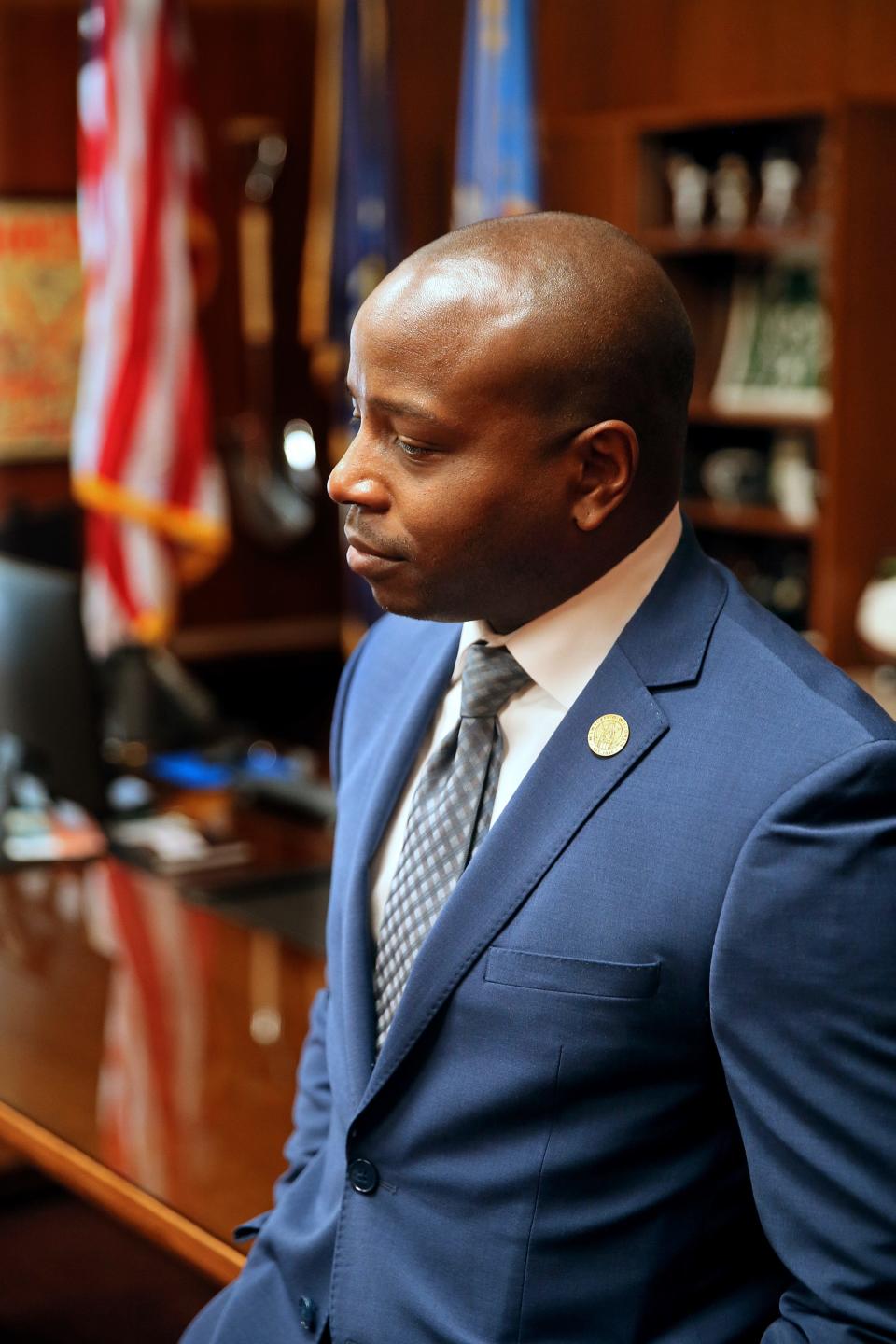
The days since Johnson's inauguration in April have been marked by the city's inability to suppress violence that erupted into a series of shootings after a Bucks game in May. Homicides remain on pace to overtake the record deaths in each of the last two years.
And a financial cliff driven in large part by a pending pension spike has consumed much of the city's remaining $200 million in federal pandemic aid, just to prop up city services. Johnson's administration is starting to pull back on hiring for vacancies in preparation for a likely need to cut city staff, and therefore services, in the coming years.
Finally, in a reminder that the coronavirus pandemic is not over, Johnson's office announced after his 100 days press conference Friday that an at-home test had come back positive. He last tested positive for the virus in January.
But there have also been bright spots for the 35-year-old, who made a quick ascent at City Hall from alderman to Common Council president and, now, the city's first elected Black mayor.
Those highlights have included an apparent thawing of relations with Republicans who control the state Legislature and whose backing Milwaukee leaders need to regain the city's financial footing.
Assembly Speaker Robin Vos commented that he had never been in the Mayor's Office when he visited at the beginning of June, Johnson recounted in a recent interview. Vos' visit came weeks after another by Senate Majority Leader Devin LeMahieu.
"There was no conversation, or at least not one that was building a positive relationship, between (former Mayor) Tom Barrett and Robin Vos," Johnson said. "We're actually having conversations in a constructive way, trying to get to a solution to the challenges that the city faces."
Others, too, have found a supportive presence in the Mayor's Office.
"He reassured us that he's in our corner to support our community," Milwaukee LGBT Community Center Executive Director Kevin Turner-Espinoza said.
Common Council President José G. Pérez said he's found an open dialogue and accessible staff under the new administration.
But for some, that relationship has not developed. African American Roundtable Executive Director Markasa Tucker said she feels strongly that Johnson still has not made an effort to engage with her or her community.
In one of the biggest successes in the new mayor's eyes, Milwaukee appears to be on the cusp of winning the 2024 Republican National Convention after local leaders, both elected and unelected, wooed party leaders to the deeply Democratic city.
If the full Republican National Committee approves the choice next month, Milwaukee will notch its second national political convention in as many presidential elections.
For supporters, it's a sign that Milwaukee is moving up.
For detractors, it's an invitation to an enemy of the city and democracy itself.
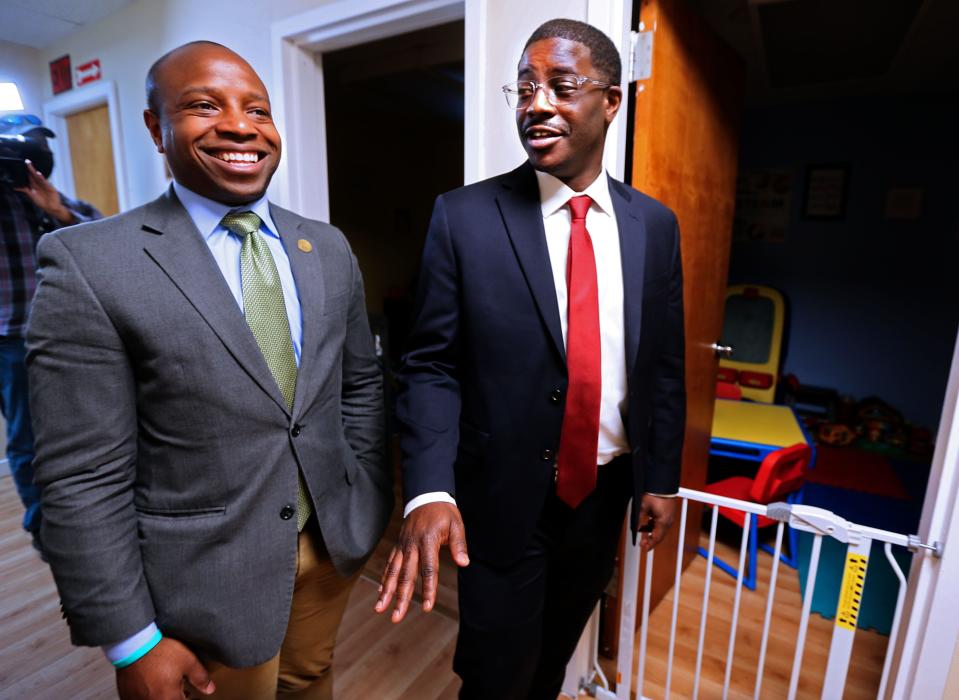
If the convention does come to Milwaukee, just months before the massive event the city's deep blue voter base will have a chance to weigh in on whether it buys the Democratic mayor's argument that hosting the Republican event is about business, not politics.
That spring 2024 election is not far from the new mayor's mind — or schedule.
Three months since his April 5 victory, his campaign website remains live.
Calendars from his first 100 days show hours set aside nearly every week at the headquarters of Nation Consulting, the Milwaukee-based political consulting team that helped him win the city's highest office.
Here are a few challenges and where efforts stand to address them so far:
On public safety
Among the top challenges facing the new administration is seemingly constant fatal and non-fatal shootings.
Johnson and Police Chief Jeffrey Norman have sought to highlight the overall 8% decrease in violent and property crimes between the first half of this year and last year.
However, those gains were tempered by a 38% increase in homicides in the same period. As of Wednesday, online police data showed 126 homicides this year compared with 91 at the same point in 2021.
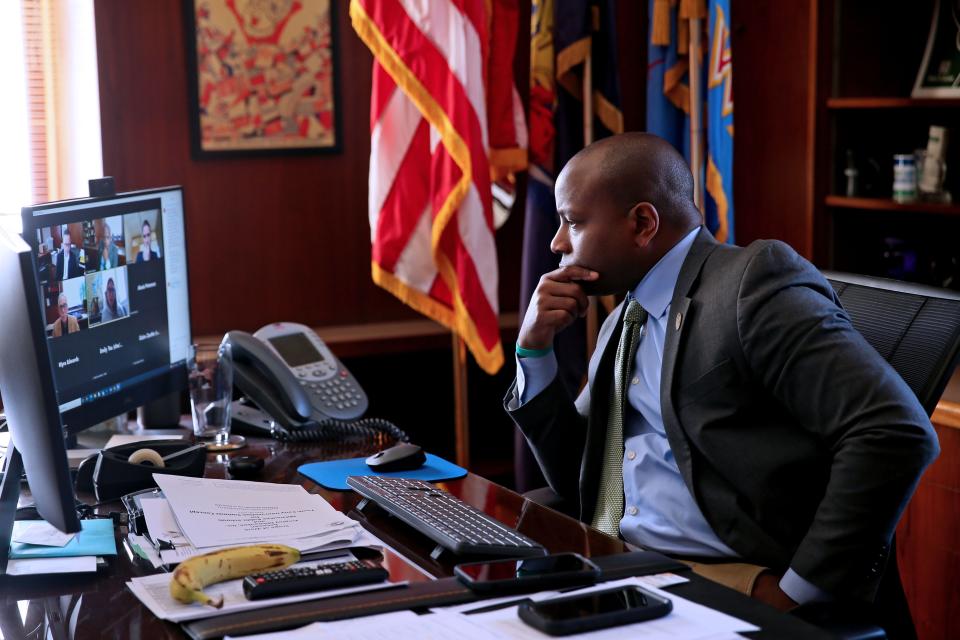
Both 2020 and 2021 saw record homicides approaching 200. There were fewer than 100 homicides in all of 2019, and the city was experiencing a four-year decline in homicides before 2020.
Non-fatal shootings have not increased at the same rate as homicides, up 2% between last year and this year so far. However, the 458 tallied this year as of Wednesday remains 40% higher than the 326 in 2020.
And most of the year-to-year crime declines still show data this year in line with 2020.
And crash data presented by police also show a decrease in fatalities from 31 to 29 and in hit-and-runs from 3,701 to 2,985.
Johnson said Milwaukee has been no exception to the violence that has gripped cities across the nation as the coronavirus pandemic upended life.
"We are working with the police and ... we've got some positive numbers to show, with the glaring exception, of course, of homicides," Johnson said.
He also traced the violence to easy access to guns and improper storage but also larger societal challenges like access to good-paying jobs.
Johnson highlighted efforts to engage young people in positive programs and behaviors, in addition to his calls for the community to be part of reversing the deadly trend.
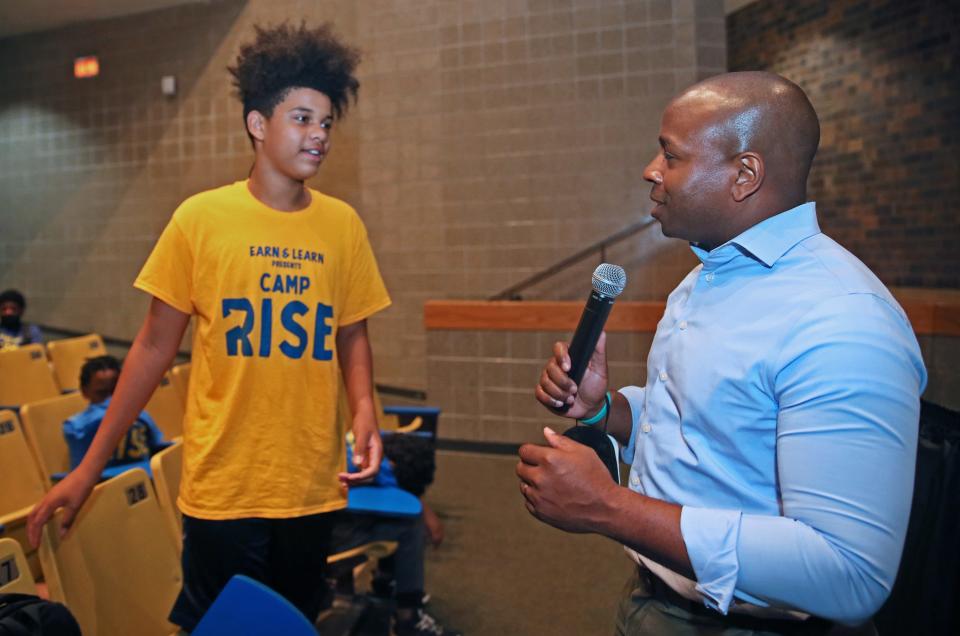
Still, the implementation of a curfew for minors by Johnson and police following a series of shootings — one of which injured more than a dozen people — in downtown after a Milwaukee Bucks playoff game has drawn criticism. None of those arrested were under 18, but Norman said at the time that the curfew was meant to protect minors.
"Sometimes it can be very hurtful that young Black leadership is also criminalizing and demonizing young, Black folks in our own community," said Angela Lang, executive director of Black Leaders Organizing for Communities, or BLOC.
Reggie Moore, director of violence prevention policy and engagement at the Medical College of Wisconsin, also slammed the curfew at a recent public meeting. The former director of the city's Office of Violence Prevention called it "the wrong reaction to an urgent problem," saying it would not have prevented those shootings because those charged were all older than 18 years old.
And some working to combat violence in the community expressed a desire for the city to serve as more of an organizing force — and make the process for accessing financial support less bureaucratic.
"I still feel there are a lot of missing links with how the city works with people on the ground," said Camille Mays, the founder of Peace Garden Project MKE whose son was fatally shot in 2019.
Johnson's prioritization of police versus the city's Office of Violence Prevention is something that the African American Roundtable and others will be watching when he presents his first budget this fall.
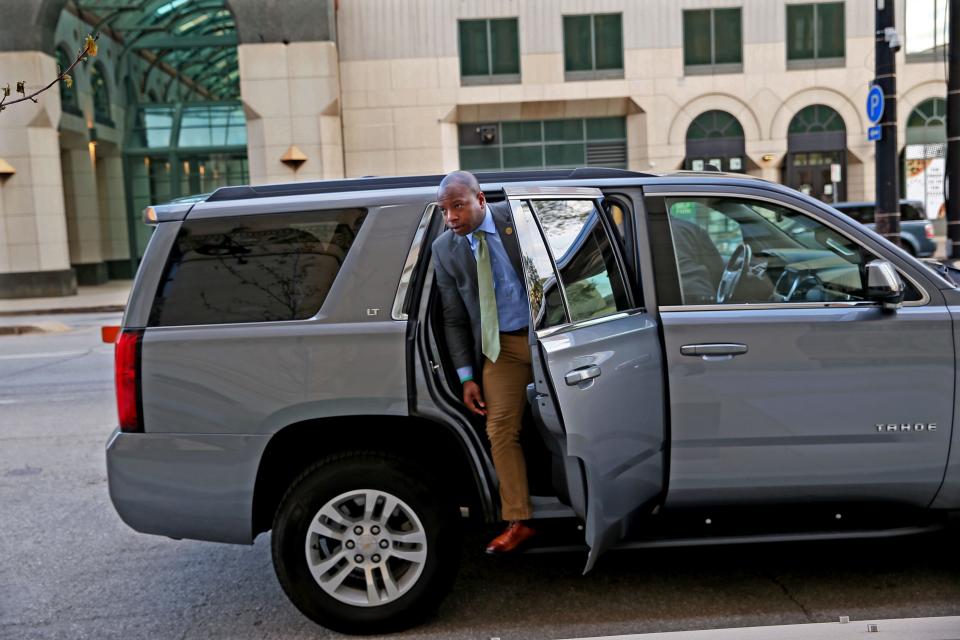
The group and others have called for the implementation of participatory budgeting to give community members a greater say in how dollars are spent at the city and for city officials to redirect $75 million from the Milwaukee Police Department to public health ($50 million) and housing cooperatives ($25 million).
It's a funding change that Johnson in an interview called a "non-starter," saying residents wanted a sufficient police force.
On city finances and the RNC
A solution to Milwaukee's dire financial straits and the city's support for the Republican National Convention are bound by politics.
Leaders in Milwaukee and Milwaukee County have long been calling on state leaders to provide greater shared revenue and, hopefully, a sales tax.
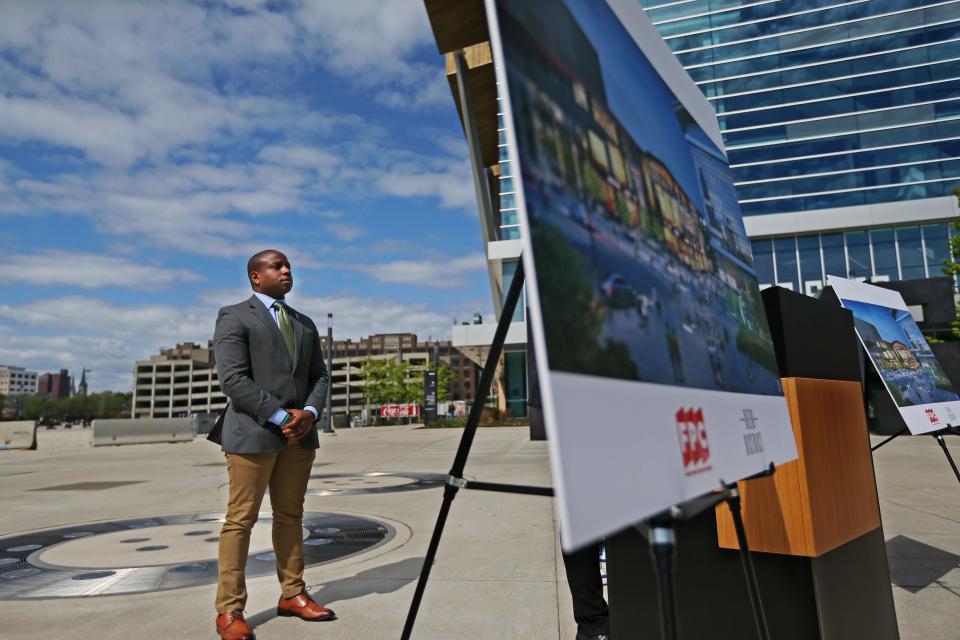
The city is in a more immediately precarious position than the county, in May projecting a $95 million deficit in 2023 that federal pandemic aid will not completely cover. Included in that figure is a spike in the city's annual pension contribution, which is expected to last for years to come.
On a parallel track is the Republican National Convention, which the council unanimously approved June 1 in part based on a calculation that rejecting the convention would kill any dialogue with state Republicans on financial relief.
On July 15, news came down that a GOP site selection panel picked Milwaukee as the host city for the 2024 Republican National Convention.
Our subscribers make this reporting possible. Please consider supporting local journalism by subscribing to the Journal Sentinel at jsonline.com/deal.
DOWNLOAD THE APP: Get the latest news, sports and more
This article originally appeared on Milwaukee Journal Sentinel: Cavalier Johnson marks 100 days as Milwaukee's 1st elected Black mayor

